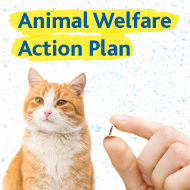
Move announced as part of Government’s plan for animal welfare
The announcement by the UK Government that it is to consult on introducing compulsory microchipping for cats, has been welcomed by animal welfare charity RSPCA.
The consultation, announced on Saturday (28 September), followed a petition launched by Cats Protection after figures revealed around eight in ten strays they take into rescue aren’t microchipped.
RSPCA head of affairs David Bowels said: “We welcome today’s announcement to consult on introducing compulsory microchipping for cats. Microchipping your pet is vitally important in ensuring that if anything happens to them, if they are lost or stolen, or hit by a car, then they can be returned to their owner.
“Whilst there are challenges on how any legislation would be enforced and what cats it would cover, the RSPCA welcomes this latest announcement as a positive move towards increasing cat microchipping by making it a legal requirement in England for owners to microchip their cats.”
Cat microchipping is one of a series of consultations announced over the weekend to protect animal welfare in the UK. As part of its Animal Welfare Action Plan, the government has also pledged to consult on a ban on the keeping of primates as pets, a ban on live exports, and to strengthen the law on trophy hunting.
David Bowels continued: “We welcome today’s announcement on four important issues of animal welfare. In particular, we have campaigned to end live exports for over 30 years due to the misery it brings to animals enduring long and stressful journeys and we have also long called for a complete ban on the keeping of primates as pets.
“As we prepare to leave the EU we have been calling on the Government to ensure that animal welfare standards are maintained and improved and we are pleased that the Government appears to be starting to deliver on this by putting better welfare at the heart of its agenda.”



 The Veterinary Medicines Directorate (VMD) is inviting applications from veterinary students to attend a one-week extramural studies (EMS) placement in July 2026.
The Veterinary Medicines Directorate (VMD) is inviting applications from veterinary students to attend a one-week extramural studies (EMS) placement in July 2026.